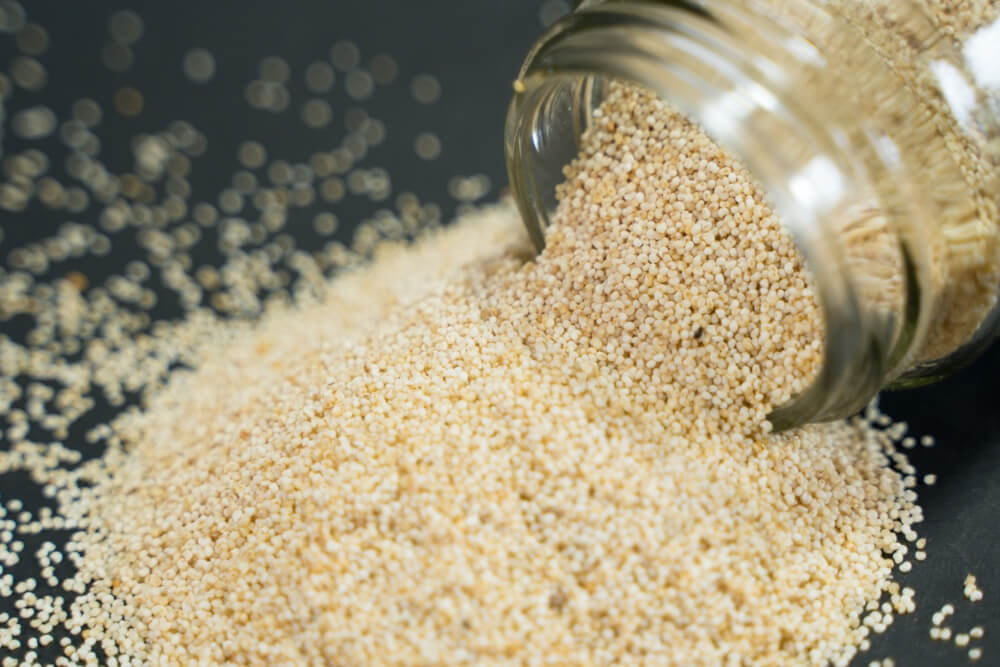Have you ever wondered if poppy seeds go bad over time? Well, we will answer that question and explore the top 10 health benefits of poppy seeds. Poppy seeds, derived from the opium poppy plant, are small but mighty in terms of nutritional value. They have been used in cooking and traditional medicine for centuries.
Despite their small size, poppy seeds are packed with essential nutrients that can contribute to your overall health and well-being. In this article, we will delve into the 10 incredible health benefits of poppy seeds. From promoting digestion and heart health to supporting bone health and boosting energy levels, poppy seeds offer a wide range of advantages. So, let's dive in and discover why these tiny seeds are worth incorporating into your diet.
Table of Contents
Nutritional Value of Poppy Seeds
Poppy seeds may be small, but they are packed with essential nutrients. They contain dietary fiber, protein, and a variety of minerals that are beneficial for your health. Just a small serving of poppy seeds can provide you with a significant amount of these nutrients.
Let's take a closer look at the nutritional composition of poppy seeds:
| Nutrient | Quantity per 100 grams |
|---|---|
| Calories | 525 |
| Protein | 18.5 grams |
| Total Fat | 43.7 grams |
| Carbohydrates | 28.1 grams |
| Dietary Fiber | 19.5 grams |
| Calcium | 1438 milligrams |
| Iron | 9.7 milligrams |
| Magnesium | 347 milligrams |
| Phosphorus | 870 milligrams |
| Potassium | 719 milligrams |
| Zinc | 7.9 milligrams |
| Vitamin B1 | 0.6 milligrams |
| Vitamin B3 | 5.8 milligrams |
| Vitamin E | 0.3 milligrams |
As you can see from the table above, poppy seeds are a rich source of protein, healthy fats, dietary fiber, and essential minerals. They also contain important vitamins like B1, B3, and E. This nutritional profile makes poppy seeds a valuable addition to a balanced diet.
Please note that the nutritional values may vary slightly depending on the source and processing of poppy seeds.
Health Benefits of Poppy Seeds
1. Promotes Good Digestion
Poppy seeds are an excellent source of dietary fiber, which plays a crucial role in maintaining a healthy digestive system. Fiber adds bulk to the stool, making it easier to pass through the intestines and preventing constipation. Regular consumption of poppy seeds can help promote regular bowel movements and prevent digestive issues.
2. Boosts Heart Health
Poppy seeds contain unsaturated fats, which are considered heart-healthy fats. These fats help lower LDL (bad) cholesterol levels in the blood, reducing the risk of heart disease and promoting cardiovascular health. Including poppy seeds in your diet can have a positive impact on your heart health.
3. Supports Bone Health
Poppy seeds are rich in essential minerals like calcium and phosphorus, which are vital for maintaining strong and healthy bones. Calcium is necessary for proper bone development and preventing conditions like osteoporosis, while phosphorus plays a role in bone mineralization. Including poppy seeds in your diet can help improve bone density and prevent bone-related issues.
4. Provides Essential Minerals
In addition to calcium and phosphorus, poppy seeds are also a good source of other essential minerals like iron, zinc, and magnesium. Iron is necessary for the production of red blood cells, while zinc and magnesium play important roles in various bodily functions. Including poppy seeds in your diet can help ensure that you meet your daily mineral requirements.
5. Boosts Energy Levels
Poppy seeds are packed with protein, which is a macronutrient that provides a steady source of energy. Including poppy seeds in your meals or snacks can help keep you energized throughout the day. The protein content of poppy seeds also aids in repairing and building tissues, making them an ideal addition to a balanced diet.
6. Promotes Healthy Skin and Hair
Poppy seeds are rich in antioxidants, which help protect the skin from damage caused by free radicals. These antioxidants also play a role in maintaining healthy hair. Additionally, poppy seeds contain essential fatty acids, which are beneficial for keeping the skin moisturized and the hair healthy. Including poppy seeds in your diet can contribute to radiant skin and lustrous hair.
7. Aids in Weight Management
Poppy seeds are low in calories and high in fiber, making them a great choice for individuals looking to manage their weight. The fiber content in poppy seeds promotes feelings of fullness and helps control appetite, preventing overeating. Including poppy seeds in your meals can help you feel satisfied while maintaining a healthy caloric intake.
8. Supports Brain Health
Poppy seeds are a good source of omega-3 fatty acids, which are essential for brain health. These fatty acids have been linked to improved cognitive function and may help prevent age-related cognitive decline. Including poppy seeds in your diet can support brain health and cognitive function.
9. Regulates Blood Pressure
Poppy seeds contain potassium, a mineral that plays a role in regulating blood pressure levels. Maintaining healthy blood pressure is essential for cardiovascular health and reducing the risk of heart disease. Including poppy seeds in your diet can help support healthy blood pressure levels.
10. Relieves Stress and Anxiety
Certain compounds present in poppy seeds have calming effects on the nervous system. Consuming poppy seeds can help reduce stress and anxiety levels, promoting a sense of calm and relaxation. However, it's important to note that moderation is key, and individuals with specific health conditions should consult with a healthcare professional before incorporating poppy seeds into their diet.
Also Like: 10 Best Essential Oils for Bruises: Natural Ways to Heal Quickly
Potential Risks of Poppy Seeds
While poppy seeds are generally safe for consumption, there are a few potential risks to be aware of:
- Opiate Sensitivity: Poppy seeds come from the same plant that produces opium, and they contain trace amounts of opiates. While the levels are usually very low, individuals who are sensitive to or have a history of opiate use may want to exercise caution when consuming poppy seeds.
- Allergies: Some individuals may experience an allergic reaction to poppy seeds. Common symptoms may include itching, hives, swelling, or difficulty breathing. If you suspect an allergic reaction, seek medical attention immediately.
- Interactions with Medications: Poppy seeds may interact with certain medications. For instance, they can increase the effects of sedatives or pain medications, leading to excessive drowsiness or slowed breathing. It's important to consult with a healthcare professional if you are taking any medications to ensure there are no potential risks or interactions.
Side Effects and Health Hazards of Poppy Seeds
While poppy seeds offer numerous health benefits, it's essential to be aware of potential side effects and health hazards:
- Digestive Issues: Excessive consumption of poppy seeds may lead to digestive discomfort, such as bloating, gas, or diarrhea. It is recommended to consume them in moderation to avoid these issues.
- Pregnancy and Breastfeeding: Pregnant or breastfeeding women should exercise caution when consuming poppy seeds due to the potential presence of opiates. It's advised to consult with a healthcare professional before including them in your diet during these stages.
- Poppy Seed Tea: The preparation of poppy seed tea involves steeping a large quantity of seeds in hot water. This method can extract higher levels of opiates and may pose health risks, including addiction, respiratory depression, or overdose. It is strongly advised to avoid consuming poppy seed tea.
It's important to note that these risks and side effects are generally associated with excessive consumption or specific circumstances. Enjoying poppy seeds in moderation as part of a balanced diet is usually safe for most individuals.
However, if you have any concerns or pre-existing health conditions, it is always best to consult with a healthcare professional before adding poppy seeds to your routine.
Do Poppy Seeds Go Bad Over Time?
You might be wondering if poppy seeds can go bad over time. The good news is that when stored properly, poppy seeds have a long shelf life. However, like many other seeds, they can lose their freshness and flavor over time. To keep your poppy seeds fresh, store them in an airtight container in a cool, dry place. This will help maintain their quality and prevent them from going bad.
How to Store Poppy Seeds?
Proper storage is essential to maintain the freshness and quality of poppy seeds. Here are some tips to help you store your poppy seeds correctly:
- Store in an airtight container: Poppy seeds are sensitive to moisture and air, which can cause them to lose their flavor and go rancid. It is important to store them in airtight containers to prevent exposure to these elements.
- Keep in a cool and dark place: Heat and light can accelerate the deterioration of poppy seeds. To prolong their shelf life, store them in a cool and dark place, such as a pantry or cupboard away from direct sunlight.
- Avoid storing near strong odors: Poppy seeds have a delicate flavor profile that can easily absorb strong odors from other foods. Therefore, it is advisable to keep them away from spices, onions, or any other strong-smelling ingredients.
- Check for freshness before use: Poppy seeds can lose their freshness over time, so it is important to check their quality before using them in your recipes. If the seeds have a stale smell or taste, it is best to discard them and get a fresh batch.
- Label the container with the date of purchase: It's important to keep track of how long you've had the poppy seeds. Write the date of purchase on the container to ensure you use them within their recommended shelf life.
By following these simple storage guidelines, you can extend the shelf life of your poppy seeds and ensure their optimal freshness when you use them in your favorite recipes. So go ahead and stock up on these nutritious seeds and enjoy their health benefits for months to come!
The Bottom Line
Poppy seeds are not only delicious but also offer a wide range of health benefits. From promoting good digestion to supporting heart health and improving brain function, these tiny seeds pack a punch when it comes to nutrition. Incorporating poppy seeds into your diet can be a simple and enjoyable way to boost your overall health.
So why not give them a try and experience the benefits for yourself? Remember to store your poppy seeds properly to ensure their freshness and quality. As always, it's important to consult with a healthcare professional before making any significant changes to your diet. Here's to good health with poppy seeds!
Must Read: Can You Smoke Shrooms? Side Effects Of Smoking Magic Mushrooms?



